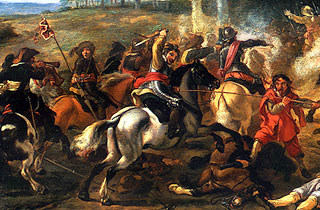Indulging in Great Field Battles
May Put Too Much at Risk

The great field battle figured conspicuously during the courses of the Thirty Years War, the English Civil War, conflicts between the Swedes and the Poles, between the Spanish and the French, and so on. But why was it not made use of other than for a handful of occasions - and only a single great confrontation - during the Eighty Years War?
 Indeed, Count Maurits van Nassau with
his cousin, after study of Roman sources, reformed the deployment of
infantry in the field against the tercios of the Army of Flanders.
From the single great battle of that war, the Battle of Nieupoort in
1600, the workability of their reforms caught the attention of military minds across Europe. Yet the Dutch relied on defensive war, for them it
was the fort and the siege. Insight into the 'why' of this
preference came from the very man who authored those reforms and who
for years commanded the Dutch forces, Count Maurits van Nassau. As
reported by an English officer, Sir Edward Cecil, who served
with the Dutch army at Nieupoort:
Indeed, Count Maurits van Nassau with
his cousin, after study of Roman sources, reformed the deployment of
infantry in the field against the tercios of the Army of Flanders.
From the single great battle of that war, the Battle of Nieupoort in
1600, the workability of their reforms caught the attention of military minds across Europe. Yet the Dutch relied on defensive war, for them it
was the fort and the siege. Insight into the 'why' of this
preference came from the very man who authored those reforms and who
for years commanded the Dutch forces, Count Maurits van Nassau. As
reported by an English officer, Sir Edward Cecil, who served
with the Dutch army at Nieupoort:
"This cause the late Prince of Orange when hee had fought the Battel of Nieupoort: to this purpose, to direct speech unto some Hottspurrs of the French nation, that had often press him to give Battel. Messirs [saith he] now you have had your desires and now you have fought a Battell, nay more, you have gained (won) a Battell, But lett mee tell you herewithall that the State hath not gotten so much as a Quart d'escu (small coin) by it; and had wee losthe Day, wee had lost all by it: Even all the my self and my Ancestors have been these three score and ten years a getting and preserving. And therefore Messirs, trouble mee no more hereafter, with talking to mee of Battells."
Any army had much to gain from success in a large field battle - and much to lose if it failed. Often, too much to lose, as the French found at Pavia in 1525, Imperial-Leaguist army found at the 1631 Battle of Breitenfeld, the Swedes (the very victors in 1631) found three years later at Nordlingen, and so on - and on.
